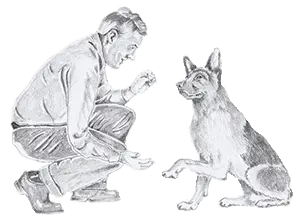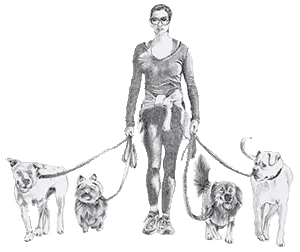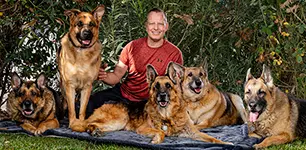
Do you need a dog trainer or a dog behaviorist? What’s the difference, anyway? When hiring a dog professional to work on a specific challenge, it’s important to understand what kind to look for.
Two types generally provide hands-on help with pets: obedience dog trainers and behavioral dog trainers. There are also professionals like me, who work in both fields, but these are distinctly different activities, and most specialize in one over the other. In addition, there is a further specialization for areas like sport dogs, service dogs, hunting dogs, working dogs, etc. This is how the dog training marketplace looks like at this point. Further, many dog trainers advertise themself as ‘specialized’ in some areas. As a result, many dog owners are looking for an expert for their goals or challenges.
What is a Professional Dog Trainer?
A professional dog trainer may have personal preferences or specializations. However, a trainer who truly understands dogs and learning science should be able to help with any pet dog training goal. That’s what it means to be a professional dog trainer. It takes training, learning, gathering experience, and time to become a professional. Yet, somehow it has gotten to the point where some dog trainers call themself experts from day one, claim to be professionals after taking one class, and even advertise themself as breed experts while barely understanding that breed. This is particularly common with so-called ‘pit bull trainers.’ For example, I am known for working with German Shepherds. My late dog Sylvester is on the logo of my company. I worked with many German Shepherds, own several German Shepherds, and love the breed. People know this about me, and many call me a German Shepherd expert. However, I never advertised myself as a German Shepherd trainer. I am a professional dog trainer before being a German Shepherd enthusiast. A professional trainer should be effective with any dog breed because they should understand learning science, evolutionary psychology, ethology, and genetics and have worked with many dogs.
However, let’s take a closer look at these two types of trainers as the pet dog training marketplace has fragmented into these.
Terminology
You would think trainers working on behavior issues have a sound understanding of dog behavior, but unfortunately, you would be wrong. It’s the wild west out there. The term Dog Behaviorist is thrown around like there is no tomorrow, as it lacks a clear definition. It can pretty much apply to anyone working with dogs. Wikipedia’s description summarizes it well:
A dog behaviorist is a person who works in modifying or changing behavior in dogs. They can be experienced dog handlers who have developed their experience over many years of hands-on experience. Or have formal training up to degree level. Some have backgrounds in veterinary science, animal science, zoology, sociology, biology, or animal behavior and have applied their experience and knowledge to the interaction between humans and dogs. Professional certification may be offered through either industry associations or local educational institutions. However, dog behaviorists have no compulsion to be a member of a professional body or to take formal training.
In summary, dog behaviorists either have formal education (with or without a degree) or just believe they have enough experience. The latter group can be correct or incorrect in that belief. No one comes to check.
To make the right choice, it’s critical to understand what each kind of dog professional does.
Dog Trainers

Dog Trainers generally train dogs to learn new skills. A dog trainer is a good choice if you want your furry friend to learn to sit, lie down, stay in a place, shake a paw or roll over on command. Remember, your dogs know how to do all these things anyway. They do them naturally—when they feel like it. A trainer will simply work with your dog on doing the behaviors on command. Many trainers will know how to accomplish these basic things.
More advanced activities like tracking, agility, search and rescue, protection work, and other specialized tasks require a more advanced skill set. The pool of trainers, who can do this effectively, is much smaller than general dog trainers. As a general rule, the more different fields of dog training a dog trainer is experienced in, the better they will be. There is a skill hierarchy amongst trainers in different training areas. For example, a skilled protection sports trainer for IGP will know more about effectively dealing with competing reinforcers (e.g., a squirrel running up a tree) than an agility trainer. The simple reason is, dealing with competing reinforcers is part of IPG trials. It is directly built into the competition. It is not part of agility training. The agility course has no direct competing reinforcers.
Make sure your dog trainer has experience in whatever you are looking for. Any honest trainer will always recommend someone more specialized when a request is outside their domain.
Dog Behaviorists

I am mostly known for behavioral work and my board-and-train programs. While I train dogs to learn new obedience commands, I am more interested in teaching dog owners how to live with their dogs and understand each other harmoniously. This is an important difference for dog owners to know.
The simplest way to put it is dog trainers teach new skills. Dog behaviorists solve problems. Make sure to hire the right dog professional for your goals when seeking help.
The most common problems dog behaviorists deal with are fear and aggression, separation anxiety, jumping up, pulling on the walk, nipping, pawing, excessive barking, digging, destruction and self-mutilation. This is something entirely different from teaching a sit or down command.
To address behavioral challenges effectively, a trainer must have a sound understanding of learning science, evolutionary psychology, and ethology. Unfortunately, too many ‘dog behaviorists’ on social media have no idea what they are doing. They watched too many episodes of the prevalent dog tv series of their time and don’t understand the nature of dogs. Their key identifier is often dog psychology, primarily a silly term. Anyone who understands learning science knows that the psychology of animals and humans is so similar that almost all studies of psychology performed on animals apply to humans and vice versa.
Play the Audio





